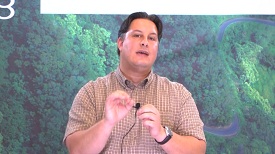I have to give it to Bing’s search team. For over the last couple of months, they are releasing great SEO posts in their blog that really contribute to the webmaster community such as the search-social connection in December and SEO practices to avoid in January.
These kind of things reinforce the search-webmasters edge from the search-webmasters-users triangle which obviously is always a good thing if you want to seriously compete with the search monopoly of Google, which (almost) always knew how to work, assist and provide information to webmasters (see everything Matt Cutts EVER published).
And as it appears, Bing has its own Matt Cutts. His name is Duane Forrester and he’s pretty known figure at the search industry where also beginning to branch out outside. He even resembles Matt Cutts with his talk and hand movements, and having your own Matt Cutts can be a winning card at least from the Bing-webmasters angle…
But let’s get back to the main issue. Bing’s Duane Forrester released lately another interesting video post discussing about establishing an authority in Bing. By the way, this topic has been discussed by Matt Cutts (the original one) few months back, however, very differently.
In the video (you can watch it at the bottom), Duane is explaining that authority was a big issue in 2011 and it is going to be even bigger in 2012 (hint for some algorithmic change? More on that later in this post). Duane divided this topic to “why becoming an authority” and “how to become an authority”.
The “Why”
Being an authority means that you (your website) is the expert in certain categories/niches. Whenever users are searching for queries that relates to your expertise category/niche then your pages will receive better rankings and more traffic and as Duane says it- “That just leads to better business success for you”.
The “How”
To become an authority Duane distributes it to the quality of content on your website (obvious) and the quality of how you socially sharing it (not obvious at all!), while NOT SAYING even one word about the old familiar “regular” links.
Where the quality of content on the website is something that almost goes without saying, attributing such a big weight to social signals is pretty surprising especially after just this week Bing’s search director, Stefan Weitz, said they are integrating social signals slowly.
Duane is providing this suggestion on social sharing- “Before you hit submit, every time you have to ask yourself this fundamental question- Will my Tweet or my post bring quality to my followers or my friends. That is a critical step.”
Does Bing Plans a Shift In The Search Algorithm Balance?
This video is raising some big questions about Bing’s future plans for its search algorithm- Is it going to grant social signals a much greater role on the expense of traditional links? Would Bing consider different social signals from social networking services such as StumbleUpon or Pinterest alongside the popular ones (“Like”, “Tweet”, “+1”) and will they carry different weights?
It is no secret that Bing is trailing behind Google market share since its launch and it doesn’t seems that a fundamental change is nearby, so maybe Bing is taking a new intriguing strategy- If you can’t win the game, change the rules!
